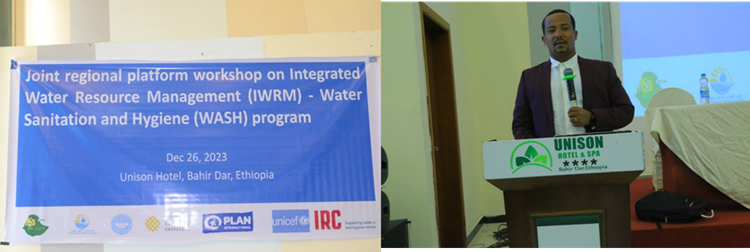Bringing people together in a joint regional forum in Amhara, Ethiopia
Published on: 27/02/2024
There's widespread enthusiasm for sector collaboration, but the journey toward it can differ greatly. A catalyst that supports initiating new ways of working can play a crucial role in unlocking this potential. It can promote positive ideas and commitments, and provide the resources needed to encourage dialogue and cooperation. While resources are commonly viewed as a major obstacle to collaboration, their presence or absence doesn't singularly determine the pace of initiative. Once an idea takes root, it tends to attract constructive input, enriching and broadening its scope over time.
The Amhara National Regional State Integrated Water Resources Management and Water, Sanitation, and Hygiene (IWRM-WASH) Forum is a prime example. It all began with a grant awarded by Hilton to IRC in 2022, through its multi-country funding. The funding was for WASH system strengthening: aiming to increase funding and resources to the sector, and disseminate best practices. Building upon this grant, IRCWASH Ethiopia proposed extending the reach of the national Water and Energy Sector Working Group to the Amhara region. Here, it would focus specifically on rural WASH initiatives.
Then, while carrying out a mapping of key WASH stakeholders in February 2023, there was a pivotal moment. The regional Bureau of Water and Energy (BoWE), the Abay Basin Administrative Office (ABAO) and the World Resources Institute (WRI), each expressed interest in establishing a similar, regional IWRM forum. This was preceded by a common understanding between IRC and the BoWE that establishing a Rural WASH focused platform was important, which in turn informed the stakeholder mapping. It is a nice example of maximising fund effectiveness as well, as WRI also received funding from the Hilton Foundation.
Negotiations ensued between the two initiatives: the proposed IWRM forum and the WASH forum, spearheaded by ABAO and the Bureau of Water and Energy, respectively. From March to July 2023, these conversations and meetings addressed crucial aspects of the process, such as merging draft Terms of Reference developed for the IWRM forum (by ABAO and WRI), and for the Water and Energy forum (by the Bureau of Water and Energy and ourselves). We also had to consider whether the forum would operate as a standalone entity or be part of existing sector events; what the content of the forum would be, what roles and responsibilities were needed, and the frequency of forum meetings.
Through a series of email exchanges and face-to-face meetings between stakeholders, we reached consensus, and co-created a unified set of Terms of Reference for the merged IWRM-WASH forum. Importantly, these negotiations also generated interest from additional people and organisations working on IWRM-WASH initiatives in the region, including the Millennium Water Alliance, UNICEF, and Plan International.
After completing a series of steps and processes, the regional launch of the IWRM-WASH forum took place on December 26, 2023, in Bahirdar, under the leadership of the regional Water and Energy Bureau and ABAO. We provided technical and financial support for the launch workshop, and so did the World Resources Institute, UNICEF, and Plan International. ABAO and BoWE welcomed 82 participants to the workshop, representing the Ministry of Water and Energy, regional Bureaus (such as Water and Energy, Health, Education, Finance, Agriculture, and Natural Resources), universities (Bahirdar University of Technology, Gonder University, Debre Tabor University, and Injibara University), development partners and others.
The one-day launch workshop featured four presentations and group discussions, with regional government officials delivering keynote speeches (notably Dr. Mamaru Ayalew, Head of the Amhara National Regional State Water and Energy Bureau) and providing closing remarks. During the event, even more participants expressed interest in joining or supporting the forum.

Mamaru Ayalew (Ph.D.), Head Water and Energy Bureau in Amhara Region opening the forum
Participants also reviewed the objectives of the forum which we agreed were to:
The forum will now convene quarterly, and we will develop the agendas collaboratively. We'll also formulate a two-year detailed action plan, led by BoWE and ABAO with the help of development partners.
At IRC we have strong opinions and we value honest and frank discussion, so you won't be surprised to hear that not all the opinions on this site represent our official policy.